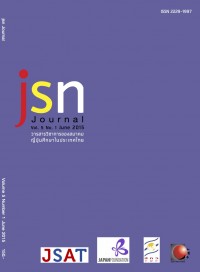ปรากฏการณ์ทางศาสนาในวัฒนธรรมประชานิยม : ว่าด้วย “พุทธะ” ในมังงะ/อนิเมะเรื่อง “Saint Young Men”
Main Article Content
Abstract
Religious Phenomena in Popular Culture: On “Buddha” in “Saint Young Men” (Saint Onii-san)
Dechopol Hemnalai*
The purpose of this paper is threefold: firstly, to study religious phenomena in popular culture through the character of the “Buddha” in “Saint Young Men” (Saint Onii-san), a Japanese manga/anime; secondly, to study the response of the Thai readers/audiences; and thirdly, to propose a way to understand this phenomenon and the appropriate attitude for Thai Buddhists. By investigating Internet resources, it was found that some Thai Buddhist readers/audiences have a negative reaction to, or are offended by, Saint Young Men because they think that it is insulting to the Buddha. For this reason the present author presents the “Triangle of Understanding: Know Ourselves, Know Others, and Know the World” for better understanding and creating a positive attitude towards this phenomenon, i.e. “Know Ourselves”-knowledge of the doctrines/principles of Theravada Buddhism; “Know Others”-knowledge of Japanese Buddhism, the socio-cultural state of contemporary Japan, and the grammar of manga/ anime; and “Know the World”-knowledge of religion and culture in the present-day context.
* Lecturer in the Department of Philosophy, Thammasat University. Address: Department of Philosophy, Thammasat University, Tha Prachan, Bangkok 10200
Article Details
ข้อความและข้อคิดเห็นต่างๆ ในบทความเป็นของผู้เขียนบทความนั้นๆ ไม่ใช่ความเห็นของกองบรรณาธิการหรือของวารสาร jsn Journal


